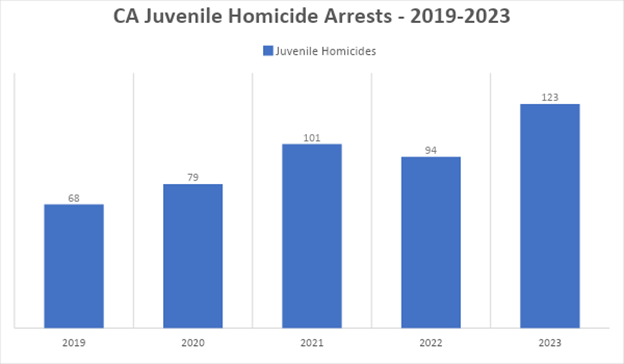On May 18, Monterey couple Curt and Shelley Chaffee were visiting San Francisco’s Golden Gate Park. Shelley is an artist and was taking photographs of the park’s bison when they were robbed at gunpoint of their Nikon camera and cell phones by two male suspects. They were able to locate a park worker who called 911. Soon after, the suspects were located and, after a pursuit where they crashed their getaway car into a nearby apartment building, were arrested. They are 17 years old.
California law allows prosecutors to charge suspects who are 16 and 17 years old as adults. Yet for reasons that are confidential due to the age of the Golden Gate Park suspects, District Attorney Brooke Jenkins’ office declined to charge them as adults and they were released from custody two weeks later. The final disposition of their case will be in August.
On July 5 in Orange County, visiting New Zealand tourist Patricia McKay was shopping with her husband when they were set upon by three suspects and shots rang out. McKay was dragged into the parking lot where she was run down, dragged 65 feet, and killed. Her husband survived. The target of the robbery was his wristwatch. Three alleged suspects were arrested including Leroy McCray (26), Malachi Darnell (18), and Jaden Cunningham (18). Orange County District Attorney Todd Spitzer has charged all three with murder including special circumstances for the use of a firearm, attempted murder, robbery, and reckless evading. In his 8-year adult criminal career, McCray has accumulated prior convictions for criminal threats, burglary, and robbery.
Both cases illustrate two concurrent criminal justice debates in California. One involves when it is appropriate to charge juvenile as adults and the other is Gov. Gavin Newsom’s push to reduce racial disparities in the justice system through decreasing sanctions, in this case limiting the use of special circumstances and sentencing enhancements.
In 2021, Newsom signed into law three bills that are all intended to curtail the use of sentencing enhancements:
- SB 81, in cases where there is a racial disparity,
- AB 333, where the offenders were alleged to be members of a gang, and
- SB 483, which applies these laws retroactively to already incarcerated inmates.
The Governor’s next target is the “Three Strikes” law.
Michael Romano, who is a staunch advocate for sentencing reform and an appointed member of Governor Newsom’s Committee on the Revision of the Penal Code and is the source of many of the bills aimed at reducing prison sentences, said Romano in February 2021, “we can improve public safety and reduce incarceration at the same time.”
Romano is also one of the authors of Prop. 47.
Los Angeles District Attorney George Gascón has embraced these revisions and issued memoranda to his staff prohibiting the use of both special circumstance and sentencing enhancements by his office.
The word traveled fast.
By December 2021, just two months after Newsom signed all three bills into law, recently paroled Aariel Maynor, entered the home of the sleeping Jaqueline Avant and shot her to death while she slept.
Maynor had been released from prison just a few months earlier under another law designed to reduce racial disparities in the prison population, Prop 57.
After his arrest, the Los Angeles Times reported that Maynor bragged that he would not face special circumstances charges. He said:
“I’m going get out of jail. I’ll probably do like 20 … 25 years, get out, you feel me?”
Faced with the overwhelming backlash, Gascón quickly modified his no enhancement, no special circumstances policy and Maynor subsequently pleaded guilty and received a sentence of 155 years. Perhaps the policy changed because the victim’s daughter is Nicole Avant, the wife of Ted Sarandos, a generous progressive donor.
Today Nicole Avant is discussing her personal experience with grief and her mother’s victimization by saying she has “forgiven” Aariel Maynor. Her decision is worthy of respect – and yet prior to his arrest, Maynor was attempting to break into the house neighboring the Avant home – presumably do the same thing.
In the case of public safety, forgiveness is not enough.
What makes a juvenile a juvenile and an adult an adult? Under California law, it is merely the tick of a clock. At 17 years, 364 days, 23 hours, 59 minutes, and 59 seconds one is still a juvenile. Yet, when the sweep hand passes 12, everything changes. Or does it?
It is an obtuse and arbitrary line that once crossed changes dramatically the legal course of events for an individual. In San Francisco, it means that two “juveniles” will be charged as juveniles, with all of the legal advantages their age allows. Yet in Orange County, two 18-year olds, along with a 26-year-old will face significantly more serious consequences.
The word is clearly out.
In 2023, juvenile arrests increased to 32,047, which is an increase of 23 percent over 2022. In the case of male offenders, 55 percent of the arrests were for felonies; 42 percent of those were for violent offenses and 20 percent of those were repeat juvenile offenders.
123 of those arrested were alleged murderers and, from 2019 – 2023, juvenile homicide arrests increased 80 percent.
Just 22 juveniles had their cases dismissed in adult court, while just 25 tried in adult court and only 16 were sent to prison.
As for the rest, it is unknown what happened to them as their dispositions are confidential.

This means that 107 murderers are being held in county custody (the CYA closed in 2021) who will be released when they turn 25, prior to the expiration of the juvenile court’s jurisdiction. There is no mechanism in the law to transfer an individual who is tried and convicted as a juvenile to adult court jurisdiction, barring the commission of a new offense as an adult.
They and thousands of other lesser offenders are California’s “Lost Boys.” They are lost in an obtuse and feckless system that is failing them – and us.
Steve Smith is a senior fellow in urban studies at the Pacific Research Institute, focusing on California’s growing crime problem.

